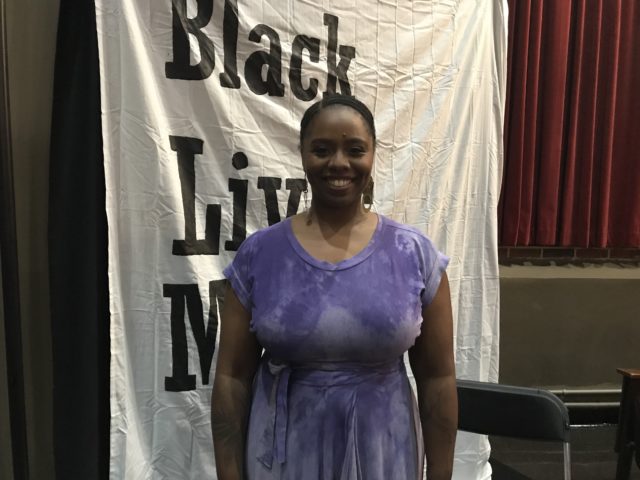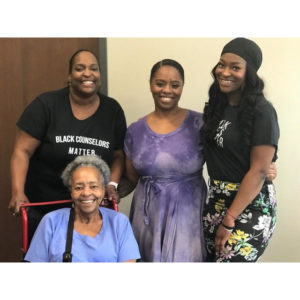
By Erica Wright
The Birmingham Times

Patrisse Cullors, author and co-founder of the Black Lives Matter (BLM) Movement, spoke to more than 300 students at the University of Alabama’s Ferguson Student Center auditorium on “Change Making: Activism & Politics.”
Cullors spoke about how BLM was established following the acquittal of George Zimmerman in the death of Trayvon Martin a 17-year-old black Florida teen killed by Zimmerman, the neighborhood watch coordinator for his gated community in 2012.
“I just gasped and . . . in that exact moment I just burst into tears and I looked at the two young women who were with me and I was like ‘how am I going to protect them [black men]’ and I immediately put my organizer hat on and was like ‘what we gone do, cause we ain’t going out like this,’” she said.
“I went online and I was looking at people’s pages and I was yelling at all the white people and I was like let me talk to my home girl Alicia, she’s online and she’s pissed off and she writes a couple things but one of the first things she writes is don’t blame this on Trayvon . . . and then she writes something else and it’s a love note, and in that love note she says ‘black lives matter’ and then I put a hashtag on it right below and she was like what’s that hashtag and I’m like girl, this is going to make this go viral.”
Within 48 hours of creating the #BlackLivesMatter, Cullors and co-founder Alicia Garza developed the political project that is BLM, which turns five this year.
“Black Lives Matter isn’t just something that we created to live online,” said Cullors. “It wasn’t just a hashtag movement. We are organizers. We understood that social media was a part of a much bigger picture for how we galvanized and challenge and build a new country.”
Global Impact
Describing Black Lives Matter, she said “it’s a vision, it’s a demand, and it’s a part of an imagination. Black Lives Matter was really a gift, it was like let’s take this thing and run with it. We’ve seen the impact not just inside the United States, but around the world. I have gone to Australia, I’ve been throughout Latin America, I’ve been to Canada and the United Kingdom and what I’ve seen over and over again is Black Lives Matter has created not just a new conversation around anti-black racism in this country, but around anti-black racism around the world.”

Cullors also spoke about how the killing of Mike Brown, an 18-year-old black teen who was fatally shot by a police officer, 28-year-old Darren Wilson in Ferguson, a suburb of St. Louis, was another important moment for BLM.
“As a human being, I couldn’t bare it and I remember calling people and saying what are we going to do? We have to go to Ferguson . . . We started contacting people in Ferguson and were asking would you want us to come . . . We got a team and we did a Black Lives Matter ride and we organized and with 600 black people from across the country, we go to Ferguson. I thought Trayvon Martin changed my life, but Ferguson changed my life because the entire community had up rose and I had never seen anything like that in my life.”
Cullors said she is committed to change and activism.
“I’m committed because I stand on the shoulders of giants. I’m committed because folks have spent hundreds of years trying to build a new here. I’m committed because I really do believe in human resilience and I believe in our capacity to do better,” she said. “I’m committed because this is really the only place I know and I want to be able to show my child that you can fight for a place you love and win in a place you love.”
After Cullors spoke to students, she answered questions in a session moderated by students Alexus Porter and Semaj’ Davis.
One question was how a black leader on a majority white campus can get engagement from other black students. Cullors used Harriet Tubman as an example.
“I think there’s an assumption that Harriet was able to galvanize lots of folks and that wasn’t the case,” Cullors said. “Sometimes you’re not going to have the support of your own community . . . with Harriet there’s a myth that she freed thousands of slaves, but she freed 300 and if there was anyone on the trail with her and got scared she put a shotgun to them. So you’re always going to have a smaller group of people lead a bigger fight because it’s hard to go against the status quo especially when you’re at a PWI (predominately white institution) so have compassion for your peers and if they don’t show up, you show up anyway.”
‘Eye-Opening’
Cullors was at the university through the efforts of Teryn Shipman, a student at UA, who along with other student leaders and organizations, was able to bring a prominent activist to Tuscaloosa. Shipman met Cullors in February during a book signing in Birmingham.

“This is something that I’ve been praying about since February . . . this is something that I’ve been working on since I met her and just to see this come to life and see a room full of people that were actually interested and wanted to see her and hear her experiences was really eye-opening for me,” Shipman said, “and to have my family be here and support and get a glimpse into my world and why I’m so passionate about this was really awesome.”
As a student leader and activist on UA’s campus, Shipman, a senior, said the visit was inspirational.
“I’m graduating in May, so I’m looking for leaders that are wanting to organize and do this work on campus because we do want to create an environment here that this is a place where students will want to be, especially black students and students of color as well as LGBTQ students too,” she said. “We want to make sure that we are visible and that we are heard and that we’re respected properly and so this event was necessary.”




